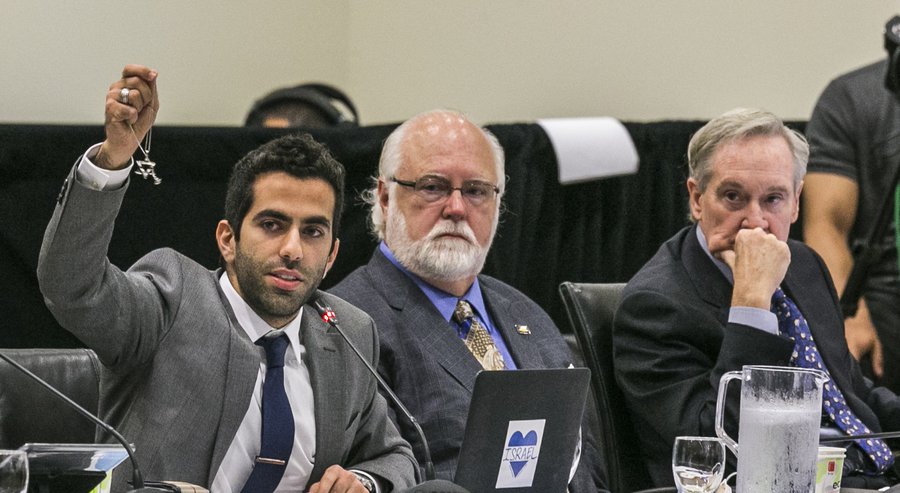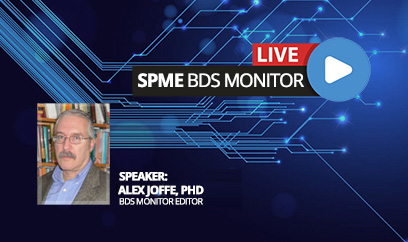University of California regents are going back to the drawing board to rewrite a statement about intolerance after a proposed version was heavily criticized as being meaningless.
“More work needs to be done,” UC President Janet Napolitano said Thursday at the regents meeting at UC Irvine. “We want to get it right.”
The statement had been drafted following a number of anti-Semitic incidents on UC campuses, including at UCLA, where “Hitler did nothing wrong” was etched into a communal table at Bruin Café last year.
In March, someone found “Zionists should be sent to the gas chamber” written on a campus bathroom wall at UC Berkeley.
Many campus Jewish groups and others had hoped the regents would adopt the U.S. State Department’sdefinition of anti-Semitism, which includes the statement: “Denying the Jewish people their right to self-determination, and denying Israel the right to exist.”
Napolitano had said in a radio interview earlier this year that she personally supported the UC adopting a similar definition, but such a statement was never brought before the regents.
Instead, the proposed “Statement of Principles Against Intolerance” presented for discussion Thursday did not include the word “anti-Semitism,” but broadly condemned discrimination without naming any group. The statement also identified academic freedom and the open exchange of ideas as core values in the UC system.
Napolitano said another statement would be drafted with input from students, faculty, regents and chancellors.
While speakers from campuses throughout the UC system urged the regents to adopt a statement that specifically addressed anti-Semitism, several people cautioned them from creating a policy that interpreted criticism of Israel as anti-Semitic, which they said could stifle academic freedom and free speech.
Protecting Jewish students from discrimination and intimidation without infringing on academic freedom and other students’ rights has been an issue on several campuses, including UC San Diego, which has a Students for Palestine chapter that holds an annual Justice for Palestine Week. The event includes mock Israeli checkpoints, which some have called anti-Semitic. Organizers of the events have said the checkpoints only demonstrate the reality of life for some Palestinians.
Rabbi David Singer, director of Hillel at UC San Diego, did not attend the meeting but said later that the regents had made the right decision.
“We welcome the regents’ move to seriously address anti-Semitism within the UC,” he said. “Hate speech and acts have no place within the university, and Jewish students have a right to learn and enjoy college free of fear and intimidation.”
Tammy Gillies, regional director of the Anti-Defamation League in San Diego, said she was happy with the regents’ decision.
“In June, we had written a letter to the regents encouraging them to accept the State Department’s definition, with many caveats to make sure free speech was still upheld,” she said. “We didn’t want this to impact anything academic.”
Regent John Pérez said he believed a statement could be created that did protect academic freedom and condemn intolerance, but he did not think the State Department’s definition was correct for the UC.
“The State Department definition isn’t one that lends itself to an academic environment,” he said. “It does limit academic discourse by conflating criticism with unacceptable activity. We’re smarter than that. We can craft a policy that protects academic freedom and free speech but that condemns and responds to unacceptable activity.”
Pérez also said he was bothered that the UC had responded to concerns from Jewish students with a statement that did not specifically address anti-Semitism.
Regent Bonnie Reiss said protecting students from intimidation while also protecting academic freedom would be challenging, but could be done.
She also stressed that the UC had a responsibility to the Jewish students who had lined up at the start of the meeting to tell regents about many incidents of anti-Semitism that had been seen on campuses in recent years.
“I hope I’m not the only one feeling chilled about that and feeling the need for us as leaders of the UC to tell those students that we hear you and that is not acceptable,” she said.
Regent Norman Pattiz said he supported the idea of the UC adopting a statement about intolerance after hearing about the incidents, but was disappointed in what was brought before the before.
“When I actually read the item, I thought, ‘What is this?’” he said, throwing up his hands. “It doesn’t say anything about anything.”
Pattiz said the regents should remember that the idea of a statement on intolerance came in response to the anti-Semitism incidents on campus.
“To completely disregard those people who brought a specific instance to your attention to deal with, I think, is frankly insulting,” he said.
Student Regent Abraham Oved read a passionate and personal statement about anti-Semitism on campuses and advocated for a strong stance against it.
Holding up a Star of David necklace he said his mother once advised him to conceal for his safety, Oved said he proudly wears it every day.
“The notion of having to deny my birthright or hide my heritage shocked and repelled me,” he said. “No one, absolutely no one, should ever be compelled to hide their identity for fear of repercussion. The moment our institutions succumb to these pressures is the same moments we have failed as governors of this institutions and this university.”
Oved said he was disappointed by the statement and the process of drafting it, as he wasn’t able to contribute to its wording.
“We need to build the credibility of our administration by establishing a moral consistency that can be applied to all student communities equally,” he said, naming groups that included Christians, Muslims, blacks, Latinos, the LGBTQ community and the differently abled.
Before Thursday’s meeting, the state Assembly and Senate had passed resolutions asking the regents to revise the statement.
Regent and Assembly Speaker Toni Atkins, D-San Diego, agreed that more work needed to be done on the statement.
“I think we have an opportunity to get it right, not just for this institution and all of the fine schools you all represent, but really to set a tone that is different,” she said.
Atkins said the State Department’s definition of anti-Semitism may not be right for the UC, but she believed the regents were up to the task to find a statement that struck the right balance and would work.
Some speakers, including professors and student members of Justice for Palestine, urged regents not to pursue a policy that would prohibit criticism of Israel. One middle-aged woman who said she was a graduate of two UC schools recalled that in her day students spoke out against the U.S. government, so today’s students should have the right to speak out against the Israeli government.




